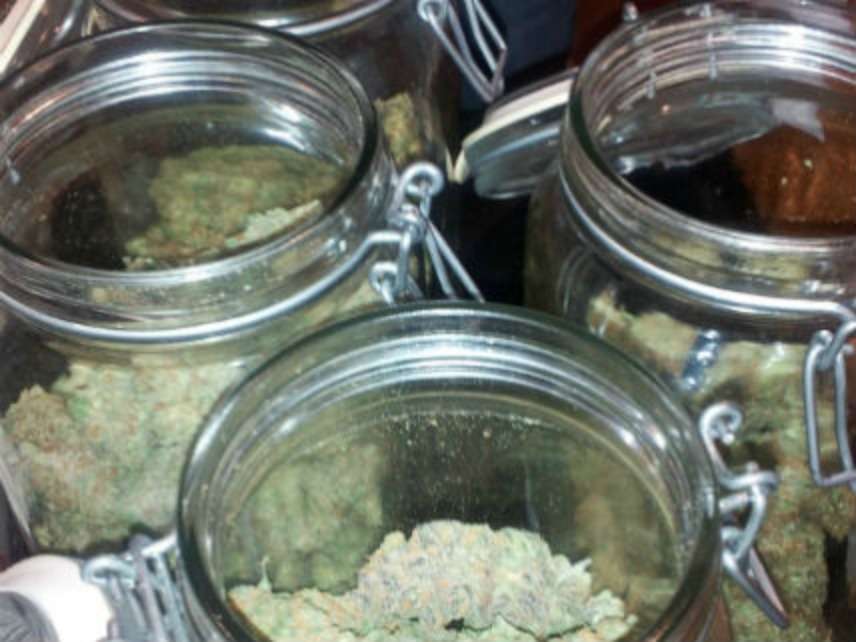California Is Taxing the Hell Out of Pot, but Washington Is Even Greedier
Alaska has the lowest taxes on recreational marijuana.

Marijuana merchants in California, who began legally serving recreational customers on Monday, complain that they are overtaxed, and they have a point. Of the eight states that have legalized marijuana for nonmedical use, California has the second highest total taxes, beaten only by Washington, where legal recreational sales began in 2014. Alaska, where state-licensed pot shops first opened for business in 2016, has the lowest taxes (although not the lowest prices).
Here is a state-by-state breakdown of recreational marijuana taxes, from lowest to highest. To estimate the impact of taxes imposed at the wholesale level, I use a typical pretax retail price for an eighth of an ounce, as advertised by dispensaries in each state.
ALASKA
Recreational sales began: October 1, 2016
Relevant taxes: $50 per ounce on sales by growers, plus local sales taxes ranging from zero in Anchorage to 7.5 percent in Homer
Upshot: The wholesale tax adds $6.25 to the price of an eighth. Based on a pretax retail price of $60 (legal marijuana is expensive in Alaska), the 5 percent sales tax in Juneau would make the final price $63 and the total effective tax rate about 17 percent. In Anchorage, which has no sales tax, the rate would be 12 percent.
OREGON
Recreational sales began: October 1, 2015
Relevant taxes: 17 percent state marijuana tax collected by retailers, plus local marijuana taxes (up to 3 percent); no general sales tax
Upshot: Marijuana taxes in cities such as Portland, Eugene, and Salem total 20 percent.
MASSACHUSETTS
Recreational sales begin: mid-2018
Relevant taxes: 10.75 percent excise tax collected by retailers, along with the 6.25 percent state sales tax and a local marijuana tax of up to 3 percent
Upshot: As in Oregon, taxes in major cities probably will total 20 percent.
NEVADA
Recreational sales began: July 1, 2017
Relevant taxes: 15 percent tax on sales by growers, 10 percent retail excise tax, 4.6 percent state sales tax, and local sales tax
Upshot: Based on a wholesale marijuana price of $2,300 per pound of buds, the first tax adds $2.70 to the cost of an eighth. Assuming a pretax retail price of $60, the final price would be $70.95 in Las Vegas, where the local sales tax is 3.65 percent. The total effective tax rate would be 24 percent.
MAINE
Recreational sales begin: unknown
Relevant taxes: 20 percent state tax on retail marijuana sales (proposed), plus 5.5 percent general state sales tax
Upshot: Assuming the proposed tax is enacted, the total tax rate will be 25.5 percent.
COLORADO
Recreational sales began: January 1, 2014
Relevant taxes: 15 percent excise tax on sales by growers, 15 percent marijuana sales tax, local marijuana taxes, and local sales taxes; recreational marijuana has been exempt from the general state sales tax since July
Upshot: Based on a wholesale marijuana price of $1,300 per pound, the excise tax adds $1.52 to the cost of an eighth. Assuming a pretax retail price of $30, the final price would be $36.65 in Denver, where the local marijuana tax is 3.5 percent and the local sales tax is 3.65 percent. The total effective tax rate would be 29 percent.
CALIFORNIA
Recreational sales began: January 1, 2018
Relevant taxes: $9.25 per ounce sold by growers, 15 percent excise tax collected by retailers, local marijuana taxes, 6 percent state sales tax, and local sales taxes
Upshot: The wholesale tax adds $1.16 to the cost of an eighth. Based on a pretax retail price of $50, the final price would be $67.10 in Oakland, where the local marijuana tax is 10 percent and the local sales tax is 3.25 percent. The total effective tax rate would be 37 percent.
WASHINGTON
Recreational sales began: July 1, 2014
Relevant taxes: 37 percent state excise tax collected by retailers, 6.5 percent state sales tax, and local sales tax
Upshot: In Seattle, where the local sales tax is 3.6 percent, the total tax rate is 47.1 percent.
High marijuana taxes make it harder for state-licensed merchants to compete with black-market dealers, who also escape the regulatory burden imposed on legal businesses. In an interview with The New York Times last fall, Tawnie Logan, who chairs the board of the California Growers Association, estimated that an eighth goes for $20 on the black market in her state. At the Harborside dispensary in Oakland, by contrast, the price ranges from $40 to $55, and that's before the retail taxes, which together add 34.25 percent.
"I don't think that the current tax rate for cannabis in California is sustainable," Harborside CEO Steve DeAngelo told KPIX, the CBS station in San Francisco. "In our shop here, the tax rate has gone from 15 percent all the way up to almost 35 percent for adult consumers. That is a huge hit. And it's going to mean that a significant number of people, less affluent consumers, are going to turn to the lower prices of the underground market."


Show Comments (92)